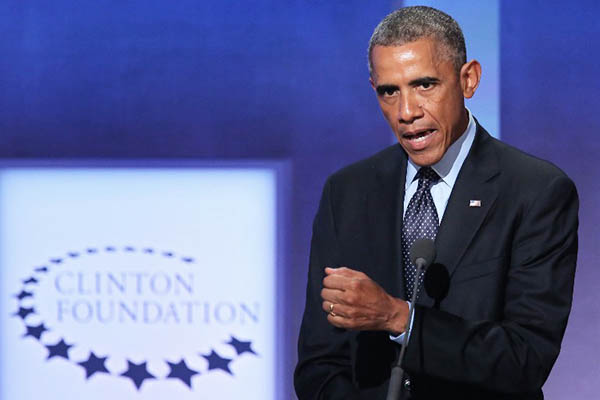
Jemal Countess-Getty Images North America—AFP
U.S. president will seek to enlist support for war against Islamic State during U.N. General Assembly.
U.S. President Barack Obama said on Tuesday that airstrikes the United States and its Arab allies had unleashed against the Islamic State group in Syria send a clear message that the world is united in confronting the jihadists.
Dozens of I.S. and Al Qaeda militants were reported killed in the raids, which Washington said had partly targeted extremists plotting an “imminent attack” against the West. Bahrain, Jordan, Qatar, Saudi Arabia and the United Arab Emirates joined in the operation that saw a torrent of bombs and missiles fired from air and sea.
Tuesday’s raids came after U.S. and French airstrikes in Iraq, opening a new front in the war against the I.S. organization, which has seized swathes of Syria and Iraq and declared an Islamic “caliphate.” The operation also carries crucial symbolic importance in the fight against Sunni I.S. as all five Arab nations are Sunni-ruled.
Thanking Arab leaders for the action, Obama said: “Because of the almost unprecedented effort of this coalition, I think we now have an opportunity to send a very clear message that the world is united.”
The U.S. has built up a broad coalition of more than 50 nations to combat the I.S. jihadist threat, and Obama will seek to enlist support from others at the U.N. General Assembly, which opens Wednesday.
Hours after the unprecedented raids on Syria, the U.S. leader declared that “the strength of this coalition makes it clear to the world that this is not America’s fight alone. It must be clear to anyone who would plot against America and try to do Americans harm that we will not tolerate safe havens for terrorists who threaten our people.”
Describing the strikes as “very successful,” the Pentagon said they hit I.S. positions, training compounds, command centers and armed vehicles in the I.S. stronghold of Raqa and near the Iraqi border.
NATO member Turkey, another Sunni nation and a neighbor of Syria, has so far remained on the sidelines, but U.S. Secretary of State John Kerry said Ankara had pledged to join the coalition. “Turkey is very much part of this coalition, and Turkey will be very engaged on the frontlines of this effort,” Kerry said after meeting Turkish officials in New York.
Speaking on national television, Turkish President Recep Tayyip Erdogan said Ankara’s contribution would consist of “all kinds of support including military and political.” Key U.S. ally Britain has so far limited backing to arming Kurdish fighters and providing supportive roles, but British media reported that Prime Minister David Cameron was considering joining airstrikes targeting I.S.
“This is a fight you cannot opt out of. These people want to kill us,” Cameron told an interview with NBC news, saying that the militants had planned attacks in Europe and elsewhere.
Washington had been reluctant to intervene in Syria’s civil war, but was jolted into action as I.S. captured more territory and committed atrocities including the beheadings of three Western hostages. The United States said it had not requested Syria’s permission for the strikes or given advance notice “at a military level.” Even so, President Bashar al-Assad said Damascus supported any international effort “to fight against terrorism.”
An anti-regime activist in Raqa, Abu Yusef, said the airstrikes had had a massive impact. The jihadists “are focused on trying to save themselves now,” he told AFP by Internet.
The raids also prompted many civilians living near I.S. positions to flee, according to the Syrian Observatory for Human Rights, a Britain-based monitoring group. That follows the exodus in recent days of tens of thousands of residents into Turkey in response to an I.S. assault on a strategic Kurdish town in northern Syria. I.S. militants have warned of retaliation to the strikes, and Algerian extremists threatened Monday to kill a French hostage within 24 hours unless Paris halted air raids in Iraq. French President Francois Hollande vowed not to give in to jihadists, declaring “no terrorist group can influence the will, position or freedom of France.”
Washington said it launched 14 strikes against I.S. targets around the jihadist stronghold of Raqa, as well as in Deir Ezzor, Albu Kamal and Hasakeh on the border with Iraq. The raids were believed to have killed a group of Al Qaeda “veterans”—known as Khorasan—plotting to attack U.S. and Western interests, the Pentagon said. The Observatory said at least 50 Al Qaeda militants were killed, as well as more than 70 I.S. members. Eight civilians, including three children, were also among the dead.
The CIA says I.S. has up to 31,000 fighters, and EU counter-terrorism chief Gilles de Kerchove told AFP Tuesday the number of Europeans joining Islamist fighters in Syria and Iraq has surged to about 3,000 from 2,000 only months ago.
Airstrikes were also conducted in Iraq, the Pentagon said, bringing the total number of U.S. raids there to 194.
Washington has said the goal of the strikes is to weaken I.S. so it can be taken on by ground forces, including the Iraqi army and moderate Syrian rebels, who are to be trained and equipped by the coalition.
Syria’s opposition National Coalition welcomed the new raids, but urged sustained pressure on Assad’s government. But the Hazm Movement, a rebel group that has reportedly received weapons from the United States, criticized the raids, saying they would benefit the regime.
Assad ally Iran also condemned the strikes, calling them a violation of Syrian sovereignty.
